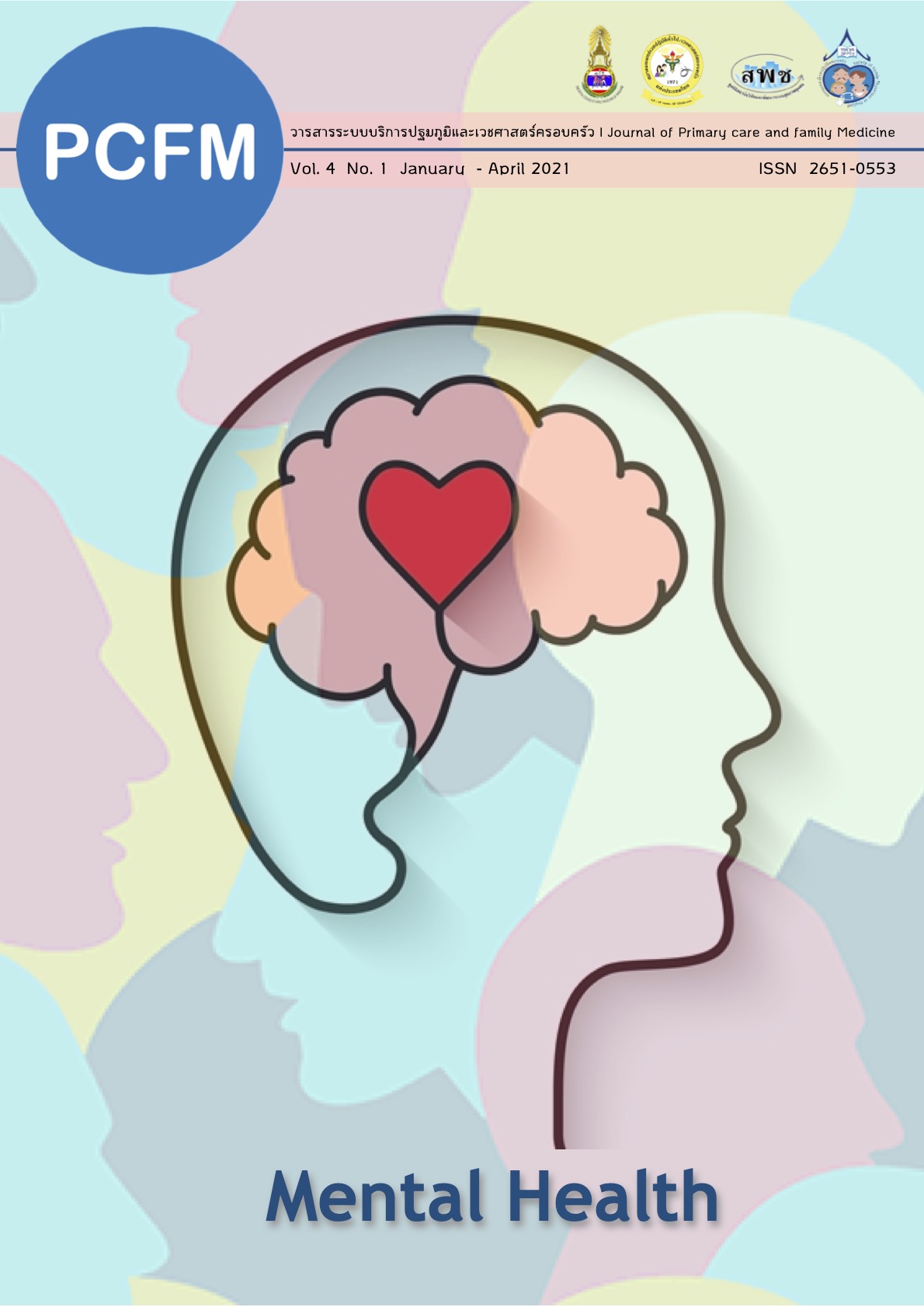The Association between Sleep Quality and Mild Cognitive Impairment in Older Adults
Main Article Content
Abstract
Background: Mild cognitive impairment (MCI) is the condition between normal brain aging and dementia. However, MCI can increase the risk of developing dementia. At present, there is much evidence that sleep problems are associated with neurodegenerative disorders.
Objective: To study the association between sleep quality and mild cognitive impairment in older adults
Design: An analytical cross-sectional study
Materials and Method: This study was performed in the Department of Family Medicine and Outpatient Services, Phramongkutklao Hospital with patients who were 60 years old or older. Data were collected from August 2020-October 2020. The participants completed three questionnaires: 1) Demographic data form 2) The Pittsburgh Sleep Quality Index: PSQI Thai version and 3) Montreal Cognitive Assessment: MoCA test Thai version. Factors associated with MCI were analyzed by multivariate logistic regression (p-value<0.05).
Results: There were 275 persons, recruited in this study. The prevalence of mild cognitive impairment was 60.4%, and 53.8% of the participants were found to have poor sleep quality. The significant risk factors related to mild cognitive impairment were the poor sleep quality (adjusted OR 8.23, 95% CI; 3.76-18.01, p-value < 0.001) and education level lower than bachelor’s degree (adjusted OR 4.65, 95% CI; 1.95-11.05, p-value = 0.001). Occasional or frequent tea/coffee drinking (adjusted OR 0.32; 95% CI; 0.13-0.81, p-value = 0.017)was associated with a protective effect.
Conclusions: Sleep quality had a strong association with this condition. Therefore, healthcare providers should be concerned about screening for cognition in patients who presented with sleep problems.
Article Details
The content and information in articles published in the PCFM journal are solely the opinions and responsibilities of the authors. The journal's editorial board does not necessarily agree with or share any responsibility for them.
All articles, information, content, images, etc., published in the PCFM journal are the copyright of the PCFM journal. If any individual or organization wishes to reproduce, distribute, or use any part or the entirety of the content, they must obtain written permission from the PCFM journal beforehand.
References
1. จำนวนประชากรจากการทะเบียน จำแนกตามอายุ เพศ และจังหวัด พ.ศ.2562 [อินเตอร์เน็ต].กรุงเทพ: สำนักงานสถิติแห่งชาติ; 2563[วันที่อ้างอิง 12 ธันวาคม 2563]. ที่มา: http://statbbi.nso.go.th/staticreport/page/sector/th/01.aspx
2. American Psychiatric Association. Neurocognitive Disorder. In: Diagnostic and Statistical Manual of Mental Disorders, 5th edition. Washington, DC. American Psychiatric Association. 2013; 591-643.
3. วลี รัตนวัตร์, ดาวชมพู นาคะวิโร, ภัทรพร วิสาจันทร์. ความชุกของาวะความสามารถของสมองบกพร่องเล็กน้อยในบุคลากรโรงพยาบาลช่วงวัยก่อนเกษียณ. วารสารสมาคมจิตแพทย์แห่งประเทศไทย. 2561; 63(1): 55-64.
4. Vorapun Senanarong, Kamolthip Harnphadungkit, Niphon Poungvarin, Sathit Vannasaeng, Samut Chonwisal, Tipa Chakorn, et al. The dementia and disability project in Thai elderly: rational, design, methodology and early results. BMC neurology. 2013; 13: 3.
5. Rosebud O. Roberts, David S. Knopman, Michelle M. Mielke, Ruth H. Cha, V. Shane Pankratz, Teresa J.H. Christianson, et al. Higher risk of progression to dementia in mild cognitive impairment cases who revert to normal. American Academy of Neurology. 2014; 82: 317-325.
6. Postuma RB, Gagnon JF, Vendette M, Fantini ML, Massicotte-Marquez J, Montplaisir J, et al. Quantifying the risk of neurodegenerative disease in idiopathic REM sleep behavior disorder. Neurology. 2009; 72(15): 1296-1300.
7. Adam P. Spira, Lenis P. Chen-Edinboro, Wu MN, Yaffe K. Impact of Sleep on the Risk of Cognitive Decline and Dementia. Current Opinion in Psychiatry. 2014; 27(6): 478–483.
8. ตะวันชัย จิระประมุขพิทักษ์, วรัญ ตันชัยสวัสดิ์. ปัญหาคุณภาพการนอนหลับของพยาบาลประจำการโรงพยาบาลสงขลานครินทร์. วารสารสมาคมจิตแพทย์แห่งประเทศไทย. 2540; 42: 123-32.
9. Hemrungrojn S. Montreal Cognitive Assessment (MoCA) Thai version [Internet]. 2007[cited 27 Nov 2019]. Available from: http:// www.mocatest.org/pdf_files/test/MoCATest-Thai.pdf.
10. Jiranan Griffiths, Lakkana Thaikruea, Nahathai Wongpakaran, Peeraya Munkhetvit. Prevalence of Mild Cognitive Impairment in Rural Thai Older People, Associated Risk Factors and their Cognitive Characteristics
11. Akekalak Sangsirilak. The prevalence of cognitive impairment in elderly. Medical journal of Srisaket Surin Burirum Hospitals. 2016;31
12. Weerakorn Thichumpa, Nopporn Howteerakul, Nawarat Suwannapong, Visasiri Tantrakul. Sleep quality and associated factors among the elderly living in rural Chiang Rai, northern Thailand. Epidemiol Health. 2018;40:e2018018
13. Rosdinom Razali, Julianita Ariffin, Aznida Firzah Abdul Aziz, Sharifah Ezat Wan Puteh, Suzaily Wahab, Tuti Iryani Mohd Daud. Sleep quality and psychosocial correlates among elderly attendees of an urban primary care centre in Malaysia. Neurology Asia. 2016;21(3):265–273
14. Aging and sleep[Internet]. Washington: SleepFoundation.org; 2019[cited 2020 Dec 25]. Available from: http:// www.sleepfoundation.org/aging-and-sleep
15. Shanna L. Burke, Tianyan Hu, Christine E. Spadola, Tan Li, Mitra Naseh, Aaron Burgess, et al. Mild cognitive impairment: associations with sleep disturbance, apolipoprotein e4, and sleep medications. Sleep Med. 2018 December; 52: 168–176.
16. Yue Jirong, Huang Changquan, Wu Hongmei, Dong Bi-Rong. Association of sleep quality and dementia among long-lived Chinese older adults. AGE. 2013; 35: 1423-1432
17. Zijun Xu, Dexing Zhang, Regina W. S. Sit, Carmen Wong, Jennifer Y. S.Tiu, Dicken C. C.Chan, et al. Incidence of and Risk factors for Mild Cognitive Impairment in Chinese Older Adults with Multimorbidity in Hong Kong. Scientific Reports. 2020; 10: 4137
18. F. Panza, V Solfrizzi, M.R. Barulli, C. Bonfigrio, V. Guerra, A. Osella, et al. Coffee tea and caffeine consumption and prevention of late-life cognitive decline and dementia: A systematic review. The journal of nutrition health & aging. 2015 Mar; 19(3): 313-28
19. Vincenzo Solfrizzi, Francesco Panza, Bruno P. Imbimbo, Alessia D’Introno, Lucia Galluzzo, Claudia Gandin, et al. Coffee Consumption Habits and the Risk of Mild Cognitive Impairment: The Italian Longitudinal Study on Aging. Journal of Alzheimer’s Disease. 2015; 47: 889–899.


